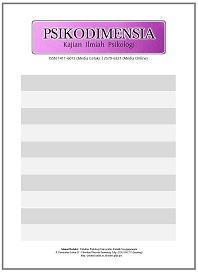Experiences of Well-Being in Retirement: A Phenomenological Study
Abstract
Anxiety in retirement often arises in every individual because of a sense of worry that individuals have to leave their jobs to face retirement. This study aims to identify and describe the meaning of pension well-being for private employees and civil servants in Indonesia. This study conducted development interviews called subject-object interviews with twenty-five retirees consisting of 15 civil servants and ten private employees. The interviews were analyzed using Giorgi's phenomenological descriptive method. Based on this phenomenon, the findings of this study are divided into four: 1) Being grateful for health, 2) Giving meaning to life and society through new experiences, and 3) Being able to make choices independently and without ties to other people. People, 4) Creating positive family relationships. In this study, HARS scale results show that most of the respondent experience anxiety; this is indicated by physical, emotional, and mental/cognitive categories. These findings promote well-being in retirement by comprehensively describing the welfare phenomena experienced by retirees.
Keywords
Full Text:
PDFReferences
Abe, Y., Fujise, N., Fukunaga, R., Nakagawa, Y., & Ikeda, M. (2012). Comparisons of the prevalence of and risk factors for elderly depression between urban and rural populations in Japan. International Psychogeriatrics, 24(8). https://doi.org/10. 1017/S1041610212000099
Adawiah, R., Olviani, Y., & Sukarlan, S. (2021). The Effect Of Pre-Phacoemulsification Education On Cataract Patients’ Anxieties In Rumah Sakit Islam Banjarmasin. Jurnal Keperawatan Suaka Insan (JKSI), 6(2). https://doi.org/10.51143/jksi.v6i2.290
Butterworth, P., Gill, S. C., Rodgers, B., Anstey, K. J., Villamil, E., & Melzer, D. (2006). Retirement and mental health: Analysis of the Australian national survey of mental health and Well-being. Social Science and Medicine, 62(5). https://doi.org/10.1016/j.socscimed. 2005. 07.013
Chentli, F., Azzoug, S., & Mahgoun, S. (2015). Diabetes mellitus in elderly. Indian Journal of Endocrinology and Metabolism, 19. https:// doi.org/10.4103/2230-8210.167553
Ekerdt, D. J., & Koss, C. (2016). The task of time in retirement. Ageing and Society, 36(6). https://doi.org/10.1017/S0144686X15000367
Flynn, M. (2007). Book Review: Weiss, R. (2005). The Experience of Retirement. Work and Occupations, 34(4). https://doi.org/10.1177/ 0730888407307311
Giorgi, A., Giorgi, B., & Morley, J. (2017). The Descriptive Phenomenological Psychological Method. In The SAGE Handbook of Qualitative Research in Psychology. https:// doi.org/10.4135/9781526405555.n11
Hamilton, M. (1993). Hamilton Anxiety Rating Scale ( HAM-A ) Reference : Hamilton M . The assessment of anxiety states by rating. Journal of Medicine Cincinnati, 61(4).
Hamilton, M. (1959). The Assessment Of Anxiety States By Rating. British Journal of Medical Psychology, 32(1). https://doi.org/10.1111/j. 20448341.1959.tb00467.x
Hansson, I., Buratti, S., Johansson, B., & Berg, A. I. (2019). Beyond health and economy: resource interactions in retirement adjustment. Aging and Mental Health, 23(11). https://doi. org/10.1080/13607863.2018.1506745
Heaven, B., O’Brien, N., Evans, E. H., White, M., Meyer, T. D., Mathers, J. C., & Moffatt, S. (2016). Mobilizing resources for well-being: Implications for developing interventions in the retirement transition. Gerontologist, 56(4). https://doi.org/10.1093/geront/gnu159
Henkens, K., & van Solinge, H. (2002). Spousal Influences on the Decision to Retire. International Journal of Sociology, 32(2). https://doi.org/10.1080/15579336.2002.11770249
Hershey, D. A., Henkens, K., & Van Dalen, H. P. (2007). Mapping the minds of retirement planners: A cross-cultural perspective. Journal of Cross-Cultural Psychology, 38(3). https:// doi.org/10.1177/0022022107300280
Holliday, R. (1997). Understanding ageing. Philosophical Transactions of the Royal Society B: Biological Sciences, 352(1363). https://doi.org/10.1098/rstb.1997.0163
Kamisasi, A. (2018). Kecemasan dan Kesejahteraan Hidup pada Karyawan yang akan Pensiun. Psikoborneo, 6(2).
Kim, J., Kwon, J., & Anderson, E. A. (2005). Factors related to retirement confidence: Retirement preparation and workplace financial education. Journal of Financial Counseling and Planning, 16(2).
Kubicek, B., Korunka, C., Hoonakker, P., & Raymo, J. M. (2010). Work and family characteristics as predictors of early retirement in married men and women. Research on Aging, 32(4). https://doi.org/10.1177/0164027510364120
Lent, R. W. (2004). Toward a unifying theoretical and practical perspective on well-being and psychosocial adjustment. Journal of Counseling Psychology, Vol. 51. https://doi.org/ 10.1037/0022-0167.51.4.482
Li, W., Ye, X., Zhu, D., & He, P. (2021). The Longitudinal Association between Retirement and Depression: A Systematic Review and Meta-Analysis. American Journal of Epidemiology. 190. https://doi.org/10.1093/ aje/kwab125
McAdams, D. P. (2013). The Psychological Self as Actor, Agent, and Author. Perspectives on Psychological Science, 8(3). https://doi.org/ 10.1177/1745691612464657
Nisa’, H. F., & Pranungsari, D. (2021). Positive Self-Talk untuk Mengurangi Tingkat Kecemasan Pada Lanjut Usia Dengan Hipertensi. PSIKODIMENSIA, 20(2). https://doi.org/10. 24167/psidim.v20i2.3269
Paul, K. I., & Moser, K. (2009). Unemployment impairs mental health: Meta-analyses. Journal of Vocational Behavior, 74(3). https: //doi.org/10.1016/j.jvb.2009.01.001
Phillipson, C. (2004). Work and Retirement Transitions: Changing Sociological and Social Policy Contexts. Social Policy and Society, 3(2). https://doi.org/10.1017/s14747 46403001611
Raaijmakers, Y., Kapodistria, S., Hewitt, S. A., & Hoonakker, E., (2018). What are feasible stress scenarios and what is their impact on pension fund portfolios? Retrieved from https://pure.tue.nl/ws/portalfiles/portal/89142140/Thesis_Youri_Raaijmakers_Final_Confidential.pdf
Ryff, C. D. (2013). Psychological well-being revisited: Advances in the science and practice of eudaimonia. Psychotherapy and Psychosomatics, 83(1). https://doi.org/10. 1159/000353263
Shi, J., Zhang, Y., Liu, F., Li, Y., Wang, J., Flint, J., Kendler, K. S. (2014). Associations of educational attainment, occupation, social class and major depressive disorder among Han Chinese women. PLoS ONE, 9(1). https://doi.org/10.1371/journal.pone.0086674
Steger, M. F. (2016). Hedonia, Eudaimonia, and Meaning: Me Versus Us; Fleeting Versus Enduring. https://doi.org/10.1007/978-3-319-42445-3_11
van Solinge, H., & Henkens, K. (2008). Adjustment to and Satisfaction With Retirement: Two of a Kind? Psychology and Aging, 23(2). https://doi.org/10.1037/0882-7974.23.2.422
Wang, X., Williamson, J. B., & Cansoy, M. (2016). Developing countries and systemic pension reforms: Reflections on some emerging problems. International Social Security Review, 69(2). https://doi.org/10.1111/issr. 12102
Wertz, F. J. (2011). Giorgi, A. (2009). The descriptive phenomenological method in psychology: A modified Husserlian approach. Pittsburgh, Journal of Phenomenological Psychology, 41(2). https://doi.org/10.1163/ 156916210x526079
Wong, J. Y., & Earl, J. K. (2009). Towards an integrated model of individual, psychosocial, and organizational predictors of retirement adjustment. Journal of Vocational Behavior, 75(1). https://doi.org/10.1016/j.jvb.2008.12. 010
Yaffe, K., Fiocco, A. J., Lindquist, K., Vittinghoff, E., Simonsick, E. M., Newman, A. B., Harris, T. B. (2009). Predictors of maintaining cognitive function in older adults: The Health ABC Study. Neurology, 72(23). https:// doi.org/10.1212/WNL.0b013e3181a92c36
Yeung, D. Y., & Zhou, X. (2017). Planning for retirement: Longitudinal effect on retirement resources and post-retirement well-being. Frontiers in Psychology, 8. https://doi.org/10. 3389/fpsyg.2017.01300
Zhu, H., & Walker, A. (2018). Pension system reform in China: Who gets what pensions? Social Policy and Administration, 52(7). https://doi.org/10.1111/spol.12368
DOI: https://doi.org/10.24167/psidim.v22i1.5031
Print ISSN : 1411-6073 | online ISSN : 2579-6321 View My Stats

This work is licensed under a Creative Commons Attribution 4.0 International License.





















